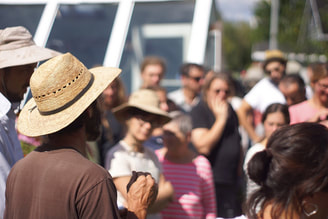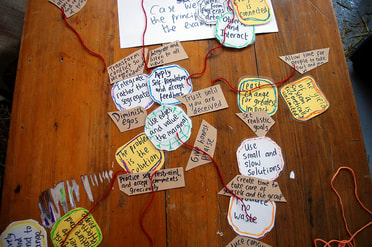Time-Based Currency pt 2. Let’s Not Throw The Baby Out With The Bathwater or Towards A Case For Time Banks “If the drinking is bitter, become the wine.” -Rilke Awesome. I started contributing to this blog as a way of thinking out loud about ideas that fall under the big tent of Permaculture. As Permaculturalists we are a proud and passionate lot given to soap boxy moments around our favorite ideas. (There is a joke in here about permacults). Hilariously, I can imagine what it would have been like to be in a permaculture design course around the Y2k thing. I can also recall my own fevered moments of self-righteousness. For instance, years ago on a particularly strange day inspired by the seduction of abundance through leisure articulated in the Bill Mollison aphorism “let the designer become the recliner” I found myself espousing forcefully the belief that we are approaching the end of work. A real techno-eco paradise. The thought was not so much A Rifkinesque end of work analysis but a post-scarcity call to action to stop work altogether. An attempt to construct an early aught style drop-out culture where participation in the economy was considered collaborating with an abstract evil known as mainstream capitalist society. The thought was not well-formed. I beat that drum with the passion of a post-scarcity evangelist. What an asshole I was. Fortunately, I left grad school and became a father. That ended that experiment. The cool thing about conceptualizing this blog as “thinking out loud” is that the writer gets feedback and a chance to revise and build on ideas. Aside from the excitement of knowing someone out there is reading, (I didn’t think there was), I heard from many people. Some of y’all hate my previous piece about time banks and saw it as an inappropriate take down of a treasured effort by communities to make the world better. Some of y'all asked me what a time bank was, some of y'all laughed and asked, "Why now? Time banks haven’t been relevant since 2008." Meanwhile, some of y’all love the piece, having experienced a similar worry with time banks in your own community. All fair points - and I love this diversity of opinion. First, let me answer the question: What are time banks? In 1980 Edgar Cahn started thinking about ways to link untapped social capacity to unmet social needs. One idea coming out of this effort was time banking. This is simply a mode of exchange that lets people swap time and skill instead of money. In a time bank economy, when a person spends one hour helping another person they receive credit. When that person needs help from someone else than they use their credits to get help. For example, If a car-less carpenter needs a ride, they can accumulate credit by working on someone’s deck and exchange the credit for rides from another member. Early on this idea represented a way to create a more equitable and inclusive future by valuing work and skills that the dollar doesn’t value. Nationally, time banks continue to flourish in some small communities and struggle in others but, with few exceptions, they’ve operated at a tiny scale. In the last few years interest in them has waned. However, I anticipate relevancy of this idea being catapulted quickly into the national consciousness as a result of Andrew Yang who is running in the Democratic primaries for the 2020 presidential candidacy. As I’m writing this the Freakonomics podcast is on NPR and Andrew Yang and his platform is the main focus of the episode. http://freakonomics.com/podcast/andrew-yang/ Y’all should listen to it. Soon, time banks will no longer be a fringe effort at social equity executed on small scales in local economies by spirited and smart people, but an idea oozing into the consciousness of every American through a gigantic-scale platform like the U.S. election. There’s that and then there is the economy. A few years ago An SPI course toured an off-grid farm project in Virginia. The year was 2016, oil was cheap, the recovery was bounding forward at full clip. The farmer was asked by a student in our group how he felt about the future. He commented that he was very scared for the future. What we need, he said, was another oil crisis to wake people up. I'm not asking for a crisis of any kind. When shit goes south people get hurt real bad, Woke AF takes no prisoners. Though the farmer did have a point. There is a correlation between novel ideas and fear. Arguably, we are in the middle of a time of general prosperity in this country. A decade ago, in permaculture courses, everyone seemed to be clad in thrift store attire duct taped at the splitting seams. Now, it’s that bastion of textile superhero do-goodness, Patagonia, that is the dominant brand, paired with a side of Smartwool socks. These are fat times indeed.  “Always predict the worst and you’ll be hailed as a prophet.” Replied the great satirist Tom Lehrer when asked why he was so popular. Here is my contribution to our collective pessimism. There is some indication that we are on the doorstep of another crisis. If one is to listen to Yang’s analysis or read Jeremy Rifkin’s 1995 book - The End Of Work - we are in a time where millions of jobs will be lost to automation without much opportunity for retraining. Resources will remain locked up, while jobs, scarce. It is a time to re-imagine yield. Time banks might be an interesting way forward. Now, I’ve gotten ahead of myself and I need to end this on a high note. With a scan of the timebanks.org website, one finds suggestions to have time bank meetings that are monthly potlucks and to create group time bank projects that are limited only by the imagination. Potlucks, seed swaps, community wellness days or volunteer work parties strike me as robust events that get a great deal of work done for non-profits and time bank members. More importantly, they serve as gathering spaces where core values can be exchanged and articulated and relationships built. This is something time banks do well. It keeps people in the game. Long after the exchange of currency dissolves, there is still a group of people and anytime there is a group of people coming together around shared values, there is a chance for intimacy. I live in the same community I grew up in. Wes Jackson’s imperative to “find a place and become native!” is an afterthought for my family. I was born into a network of people, I grew up with them, and for the most part, things haven’t changed. For others who move to the valley or experience life on the margins in a new community, a connection can be tougher. Sometimes churches are the answer and other times it’s the school system or sports. Still, for many, especially those seeking alternative answers to struggles that the mainstream solutions seem to come up short on, time banks can be a great relief. I wish I could keep going on about the feel-goods around the concept of time-based currency. But, for now, I’m out of time. In part 3, I’ll dive deeper into the analysis of what time banks do well and attempt to integrate this into what we teach at SPI: The 8 forms of capital. This is the second installment of a four-part piece on time-based currency and permaculture economics. Stay-tuned y’all, it’s getting fun. For more information on Cahn - a fascinating man. Check out this 2018 Forbes article. https://www.forbes.com/sites/devinthorpe/2018/03/21/time-banking-helps-build-individuals-organizations-and-communities/#6824a5965ba4 And more info. https://timebanks.org/
1 Comment
4/29/2020 03:12:49 am
I really appreciated reading your blog. It was very healthy authored and easy to understand. Unlike added blogs I have read which really not that are good. I also establish your posts very interesting. In information after reading, I had to go explain it to my friend and he enjoyed it as well!
Reply
Leave a Reply. |
Authors
Daniel Firth Griffith Archives
June 2022
Categories |
Proudly powered by Weebly

 RSS Feed
RSS Feed